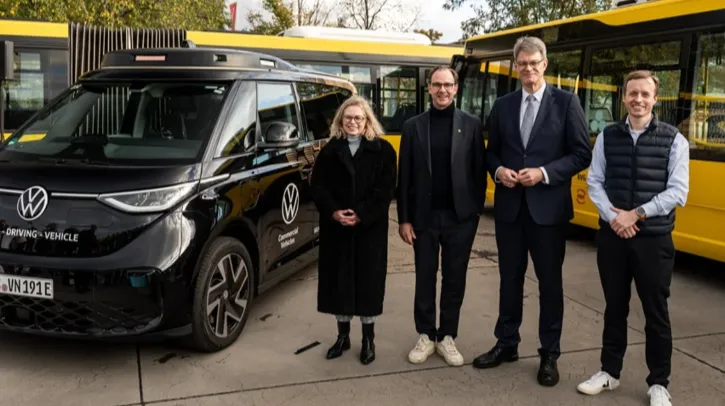The first ID. Buzz AD pilot vehicles have been deployed on Berlin’s public roads, equipped with Level 4 technology, including software systems and services from Volkswagen subsidiary Moia. The Northwest Level 4 (NoWeL4) project aims to combine traditional public transportation with flexible autonomous offerings.
It is hoped that the pilot project will pave the way for the later rollout of Germany’s largest fleet of autonomous vehicles as part of the public transportation system.
Henrik Falk, CEO of BVG (Germany’s largest public transportation company), said, “[The launch] marks the beginning of a new era. Regardless of life situation, autonomous vehicles will enable us to create an entirely new mobility system that truly meets people’s individual needs in our city.”
The next phase is scheduled for the first half of 2026, when passenger test drives are set to begin. The project has received funding of €9.5m (US$11m) from the Federal Ministry of Transport.
Federal transportation minister Patrick Schnieder noted, “Autonomous driving is the key to the mobility of the future. It stands for greater efficiency and inclusion in road transport. Projects like the planned autonomous shuttles in northwest Berlin are therefore groundbreaking.”
In the NoWeL4 project, five vehicles will operate with passengers in a roughly 15km2 test area covering parts of Spandau, Charlottenburg-Wilmersdorf and Reinickendorf. The vehicles will move freely within the area and serve around 80 stops. During test drives, a safety operator will remain on board to intervene if necessary, while a control center monitors the vehicles remotely.
Ute Bonde, senator for mobility, transportation, climate protection and environment, added, “Autonomous shuttles, which will operate reliably and flexibly in the future, are a key vehicle toward tomorrow’s mobility.”
Sascha Meyer, CEO of Moia, concluded, “We show that autonomous mobility made in Europe is already a reality. Together with BVG, we have reached an important milestone. We are bringing our complete solution – vehicle, software and services – to Berlin’s streets.”
The project will run until 2027, after which autonomous transportation is expected to become a permanent part of Berlin’s mobility system.
In related news, Stellantis and Pony.ai to co-develop and test Level 4 AVs in Europe


